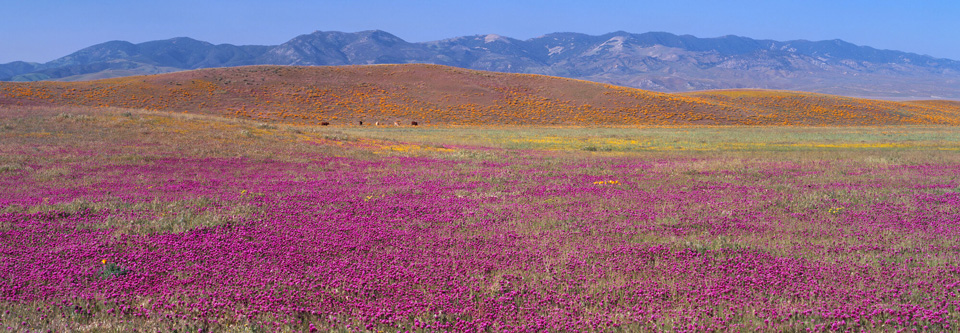
A field of wildflowers on the proposed Centennial project site is seen in this 2005 photo.
Credit: Richard Dickey.
Centennial Ruling Signals Officials Must Consider California Wildfire Risks
April 9, 2021 - LOS ANGELES— In a major victory against a destructive development larger than Griffith Park, a judge has issued a ruling blocking Tejon Ranchcorp’s Centennial. The project would have put 57,000 residents on remote, fire-prone wildlands 65 miles north of downtown Los Angeles.
Los Angeles Superior Court Judge Mitchell Beckloff found that the development’s environmental review failed to account for the increased wildfire risk the 12,000-acre project would pose to surrounding wildlands. The ruling sends a clear signal that elected officials across the state must consider the serious risks of building on wildfire-prone land.
Between 1964 and 2015, 31 wildfires larger than 100 acres occurred within five miles of the site, including four within the proposed project’s boundaries. Nearly all contemporary wildfires in California are caused by human sources such as power lines and electrical equipment, and development increases that threat.
“The court’s rejection of the Tejon development highlights the danger of building in high fire-risk areas,” said J.P. Rose, a staff attorney at the Center for Biological Diversity. “The science is clear that developments like Centennial will literally be built to burn, and our elected officials can’t continue to downplay these risks through inaccurate environmental reviews. This is a wake-up call for policymakers across California.”
The ruling found that the environmental review’s conclusion that “wildfire risk impacts outside of the project site will be reduced to less than significant is not supported by any analysis.” The court’s decision on Tuesday follows a recent Center report showing how construction in high fire-risk wildlands puts more people in harm’s way and contributes to dramatic increases in fire suppression costs. The California Attorney General recently challenged several developments in fire-prone areas, including one in Guenoc Valley, where a proposed project’s footprint includes portions of the recent LNU Complex Fire.
The 19,000-home Centennial development would add 75,000 new vehicle trips a day to the region’s already-clogged freeways, undermining California’s climate goals and generating more air pollution. The court’s ruling also determined that the county failed to adopt all feasible mitigation measures to reduce the development’s massive greenhouse gas impacts.
The Centennial development would destroy thousands of acres of rare wildflower fields and native grasslands.
“Tejon Ranch is home to one of California’s last and greatest native grasslands, the kind that prompted early admirers to write about fields of wildflowers painting the landscape,” CNPS Conservation Program Director Nick Jensen said. “Californians shouldn’t have to make the choice between irreplaceable habitats or affordable housing. We deserve better. This decision reflects a growing body of evidence that ongoing sprawl into the wildland urban interface is not only bad for nature, but for people too. It’s just not worth the cost.”
Centennial would also require construction of an $830 million, taxpayer-subsidized six-lane freeway. The new freeway and development would block the movement of mountain lions, which are already struggling to maintain genetic diversity because they are hemmed in by existing highways and development.
Centennial and Tejon Ranch Company have recently been mired in controversy. Tejon is allegedly in breach of the historic 2008 “Ranchwide Agreement” with the Natural Resources Defense Council, Sierra Club and other conservation groups. These groups filed a lawsuit against Tejon on Dec. 2, 2020, after Tejon withheld legally required payments to the Tejon Ranch Conservancy, which is charged with managing conservation lands on the ranch.
The environmental review for Centennial relies on the conservancy to manage conservation lands set aside as mitigation for the development.
Tejon also blacklisted scientists and community members from accessing the ranch and was subject to fines for the illegal killing of at least 11 mountain lions to accommodate trophy game hunters. The Center, CNPS, and other groups have long argued that the private Ranchwide Agreement is inadequate to protect the ranch, particularly when the state of California has spent millions of taxpayer dollars to preserve portions of it.
In approving Centennial last year, Los Angeles County supervisors Hilda Solis, Janice Hahn and Kathryn Barger disregarded the opposition of thousands of residents, dozens of environmental and community organizations, the California Air Resources Board, the Santa Monica Mountains Conservancy, experts in fire safety and public health and the L.A. Times editorial board.
The court’s ruling comes in response to two lawsuits filed by the Center for Biological Diversity, California Native Plant Society and Climate Resolve.
The Center for Biological Diversity is a national, nonprofit conservation organization with more than 1.7 million members and online activists dedicated to the protection of endangered species and wild places.
The California Native Plant Society is a statewide organization working to save and celebrate California’s native plants and places via plant science, advocacy, education, and horticulture. CNPS has more than10,000 members in 35 chapters throughout California and Baja to promote its mission at the local level. www.cnps.org
Source: Center for Biological Diversity








